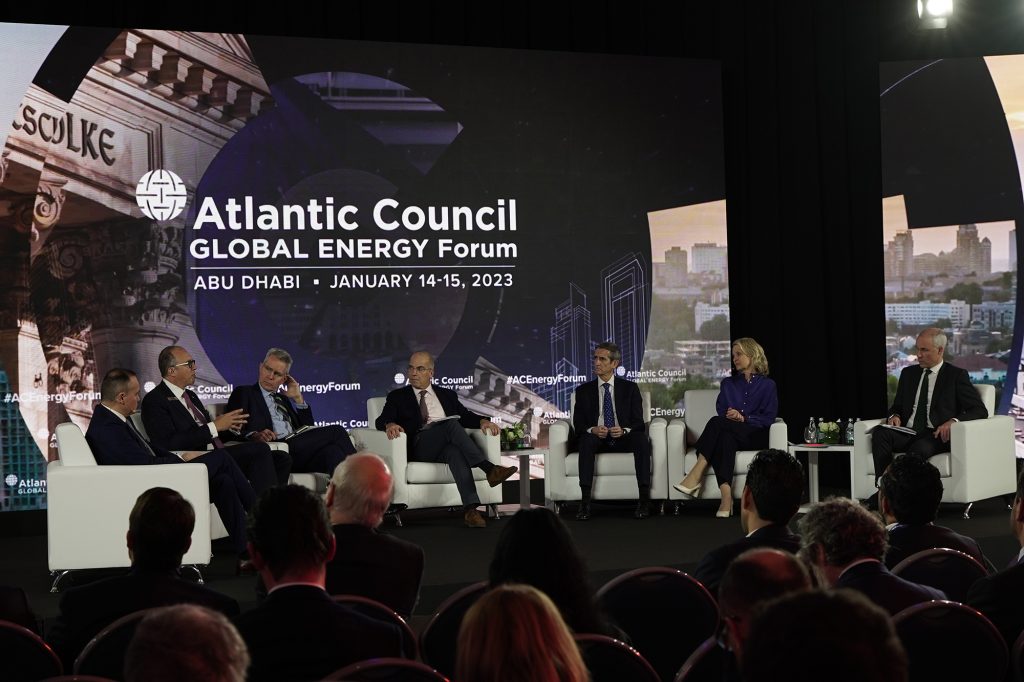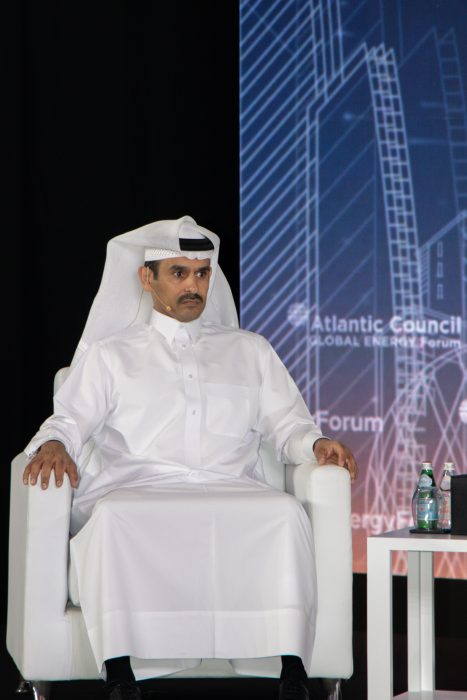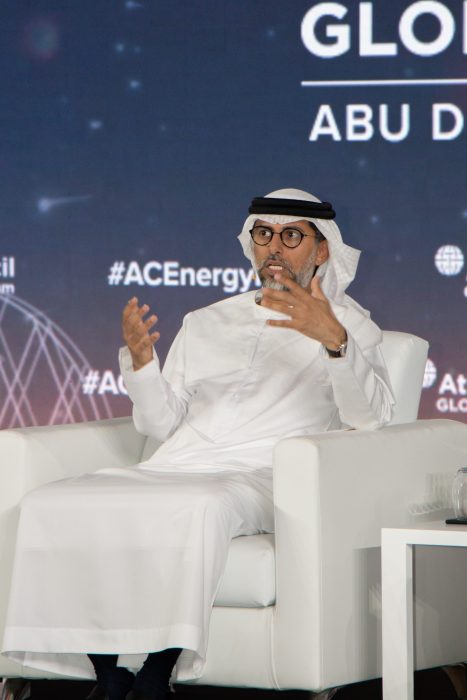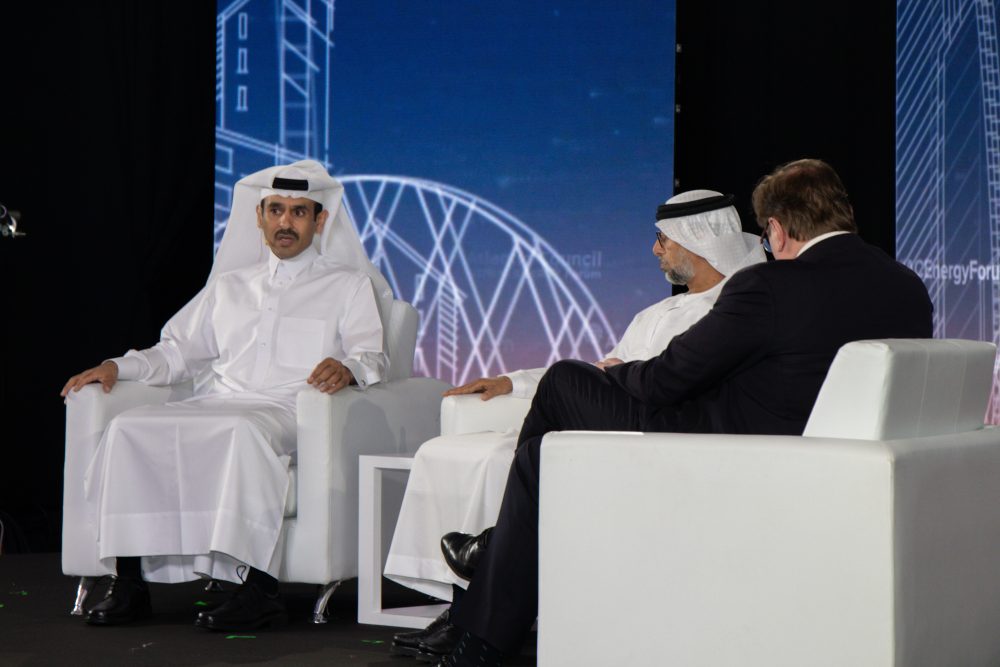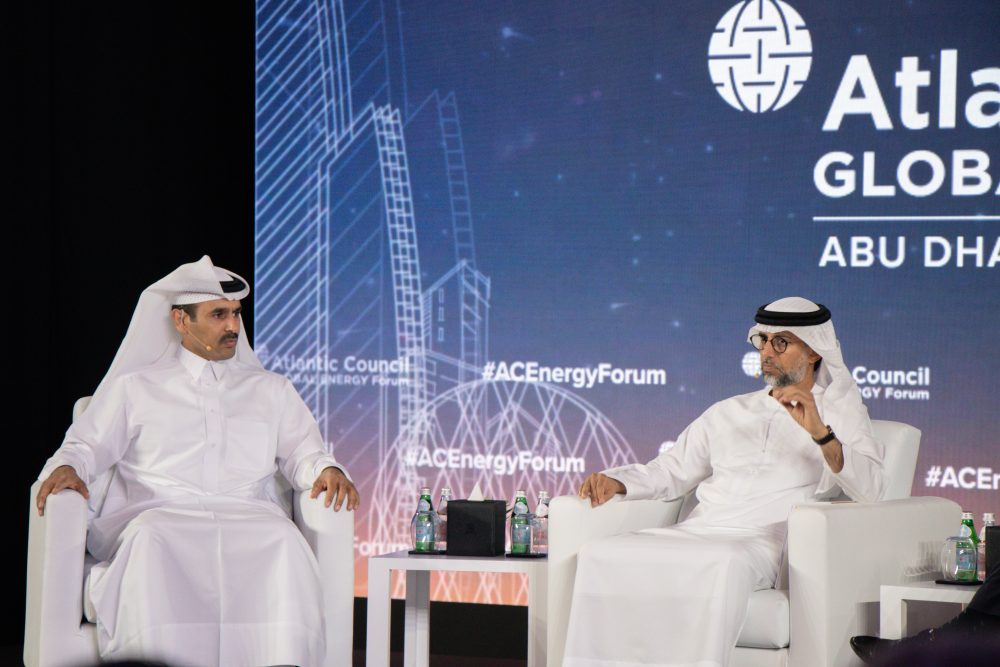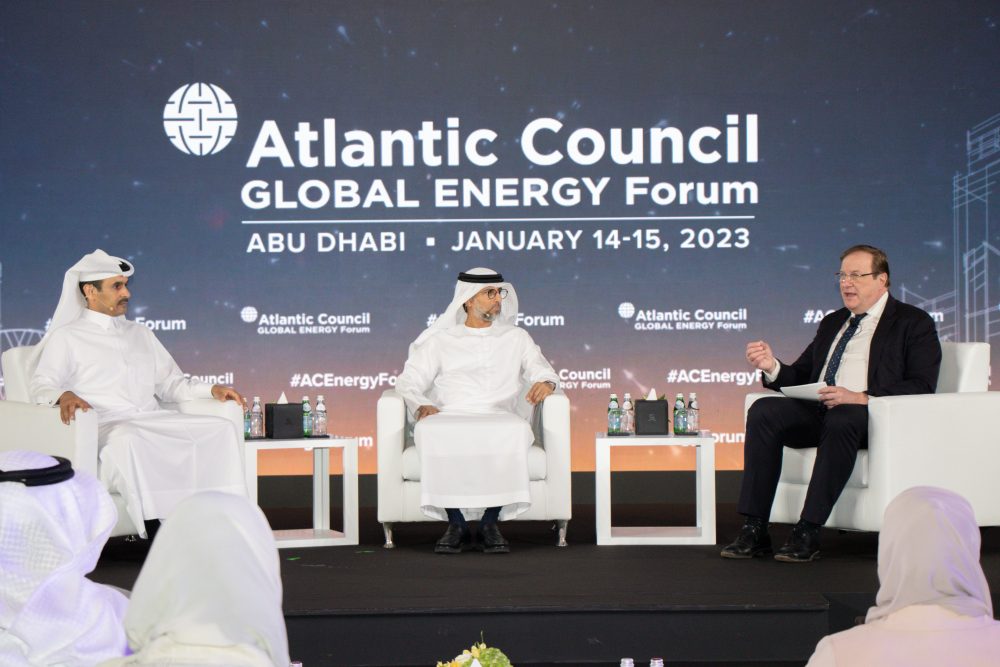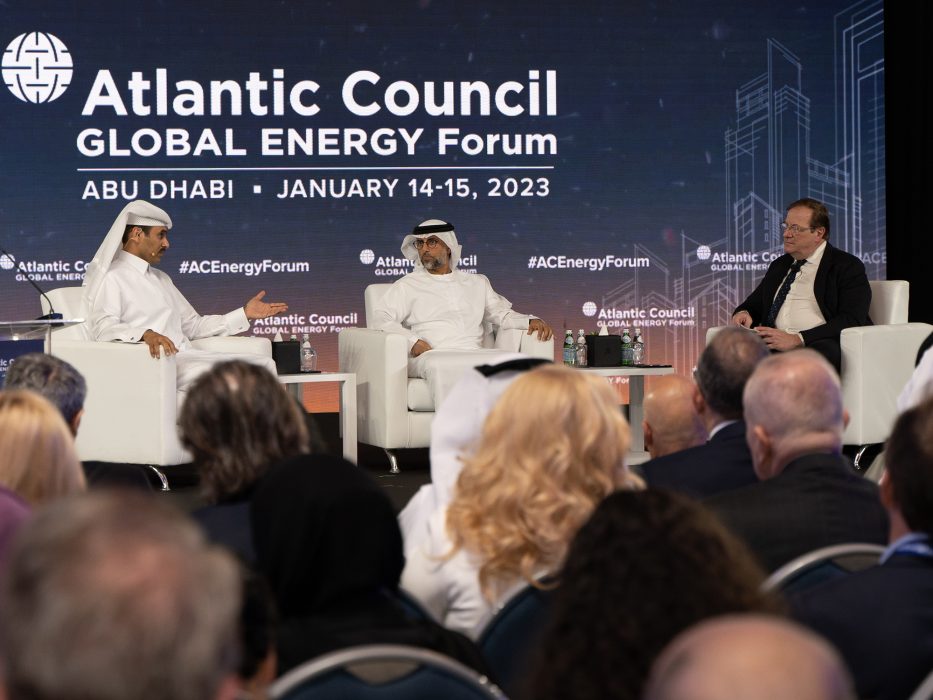[ad_1]
Call it a double whammy: The two-hit blow to the global energy system—dealt by the COVID-19 pandemic and Russia’s war in Ukraine—is wreaking havoc, bringing uncertainty about the future of energy security and the pace of the energy transition.
But that’s only spurred the world’s most influential energy experts and policymakers to take another look at the needs of the energy system and devise new policies, practices, and standards to fill those needs. And from January 14 to 15, many of them are gathering at the Atlantic Council’s Global Energy Forum to lay out their solutions and call for urgent collaboration on improving energy security and accelerating progress toward climate goals.
Below are highlights from the event, hosted by the Global Energy Center in partnership with the United Arab Emirates Ministry of Energy and Infrastructure as part of Abu Dhabi Sustainability Week, and featuring leaders such as COP28 President-Designate Sultan Al Jaber and US Special Presidential Envoy for Climate John Kerry.
The latest from Abu Dhabi
JANUARY 14, 2023 | 6:15 AM ET WASHINGTON | 3:15 PM ABU DHABI
The role of natural gas vs. renewables sparks debate
Are expanded investments in natural gas fundamentally in conflict with renewable energy as the world ponders the reliability challenge of the coming decades? This was a central debate among panelists on Saturday at the Global Energy Forum.
Paddy Padmanathan, vice-chairman and CEO of ACWA Power, which has a wide-ranging portfolio of projects in several developing countries, argued that the focus should be on the potential of renewable and emerging energies to power the future. He suggested that Europe can rapidly replace Russian energy resources with expanded renewable power and that it is already doing so. Likewise, many developing countries are starting from the ground floor on energy access altogether; renewable energy can be deployed quickly and effectively at scale, compared to conventional fuels projects which could take a decade or longer to become operational.
But the other panelists had different views. Helima Croft, managing director and head of global commodity strategy of RBC Capital Markets, cautioned that the worst of the global energy supply uncertainties may be yet to come—for example, if China reopens and dramatically increases its oil and gas demand later this year. She expressed concern that Europe and the world writ large may be forced to rely on the Organization of the Petroleum Exporting Countries (OPEC)—which has the only real spare capacity in the world—and traditional energy diplomacy in such a circumstance.
Osama Mobarez, secretary general of the East Mediterranean Gas Forum, emphasized that a strategy like REPowerEU, which may prove viable in Europe, may not be so in many developing countries. He warned that no one solution (such as renewable energy alone) can satisfy the energy needs of the world and that oil and gas will remain integral to the global energy system for years to come—themes echoed by speakers throughout the Forum. Carlos Pascual, senior vice president for global energy at S&P Global Commodity Insights, concurred that multiple energy sources are essential in a world where billions of people still lack access to reliable power and clean cooking resources. He added that high capital costs for many developing countries, which are not typically a barrier to renewable energies with high up-front costs in the United States and the European Union, are a major challenge that could potentially shut these economies out of major growth opportunities due to poor energy access.
This debate suggests that equity and justice considerations around clean energy, the Just Transition, and energy poverty remain fundamental challenges despite the rapid, and ongoing, progress in lowering barriers to zero-carbon energy sources.
JANUARY 14, 2023 | 5:15 AM ET WASHINGTON | 2:15 PM ABU DHABI
Europe has taken major strides to reduce its dependence on Russian energy. How can it work for the long haul?
Europe has just faced one of the most dangerous, fraught years in its recent history—with energy security at the heart of the challenges presented by Russia’s invasion of Ukraine. At the Global Energy Forum on Saturday, Ditte Juul Jørgensen, the European Commission’s director-general for energy, joined officials and business leaders to discuss how Europe weathered the storm (so far) and what the European Union (EU) can do in concert with its allies and private-sector leaders to remain resilient against Russia’s ongoing weaponization of energy.
Jørgensen’s keynote remarks highlighted how the EU’s energy security strategy, RePowerEU, was initially received with skepticism at its launch in May 2022—with critics asking: “Can Europe reduce its dependence on Russian energy supplies as much as they say they want to?” she recalled. “Yes is the answer after this year, and it has been done swifter than what anyone had in mind.”
She argued that by setting clear and binding targets, and matching action with ambition, Europe was able to withstand Russia’s attempts to starve the continent of energy. She concurred with Maksym Timchenko, CEO of Ukraine’s DTEK, who argued during the panel discussion that Ukraine can, and will, rebuild its energy infrastructure and become a reliable supplier of natural gas, nuclear, and renewable energy to its European neighbors. “Putin will not plunge Ukraine into darkness,” he said. “The country will not be frozen. And we will be stronger after this winter season.”
Geoffrey Pyatt, assistant US secretary of state for energy resources, said that the Russian invasion has demonstrated the strength and endurance of the US-EU alliance and that the United States remains firmly committed to seeing Europe through the upcoming winter and beyond. US liquefied natural gas (LNG) exports and the shared commitment to energy transition, Pyatt said, are central to this partnership. He framed the Inflation Reduction Act, currently a source of transatlantic tension given its tax credits for electric vehicles made in the United States, as an opportunity for Europeans to invest in the United States and ultimately accelerate the energy transition on both sides of the Atlantic.
Panelists representing European energy companies offered their own suggestions on how Europe might move forward. Anatol Feygin, executive vice president and chief commercial officer of Cheniere Energy, suggested that his company has pioneered the very model of market flexibility that enabled Europe to resist Russia’s manipulation of energy markets. Even so, he argued that it is critical for suppliers of natural gas to continuously improve the lifecycle emissions profiles of their products. Luis Cabra, deputy CEO of Repsol, noted that while Europe has made vast strides in reducing emissions, renewables alone cannot solve the complex, multi-faceted problem of economy-wide transition.
Ben Wilson, chief strategy and external affairs officer of National Grid, suggested that the powerful combination of hydrogen and renewable energy is a compelling long-term solution for Europe and that investment in transmission must accompany the anticipated enormous expenditure in new renewable energy capacity. Amid these varying perspectives on what to do next, one thing is clear: Europe has a great deal of work ahead to fully disentangle itself from Russian energy over the long term.
JANUARY 14, 2023 | 2:00 AM ET WASHINGTON | 11:00 AM ABU DHABI
What will it take to solve the energy trilemma?
Panelists discussed the challenges in solving the energy trilemma—affordability, reliability, sustainability—at the Global Energy Forum on Saturday, soon after the Atlantic Council’s Global Energy Center launched the 2023 “Global Energy Agenda.” The panel featured Albanian minister of infrastructure and energy Belinda Balluku and experts representing private-sector energy companies including Crescent Petroleum, General Electric, and Excelerate Energy.
Balluku opened the discussion with a frank assessment of the energy security situation in Southern Europe. She pointed out that there’s a need for not only a range of energy solutions to address the current crisis fueled by the Russian war in Ukraine, but also for long-term resiliency and economic growth in the region. She highlighted the importance of rapidly expanding Albania’s renewable energy resources (an expansion that has been accelerated all over Europe by Russia’s recent invasion). But she also noted the importance of Albania’s strategy around Floating Storage Regasification Units (FSRU)—a strategy supported by the United States—which has since 2020 become a cornerstone project supplying imported liquid natural gas to Albania’s neighbors. Diversification of energy supplies and suppliers, she concluded, is thus crucial to Albania’s and Europe’s energy security. Steven Kobos, president and chief executive officer of Excelerate Energy, concurred with Balluku and pointed to his company’s rapid response FSRUs in Finland and elsewhere. He warned, however, that a real supply crisis for natural gas could be in the making as demand outside Europe could grow in the coming months and new supply in the near term will be sharply limited as new production infrastructure is still years out from operations.
The other panelists offered similarly nuanced views of the role of gas in the energy transition—particularly when considering the unique needs of many developing countries. Neeraj Agrawal, chief financial officer of Crescent Petroleum, described his company’s work harnessing natural gas to shift Iraqi electricity generation away from diesel fuel, which is more polluting. He argued that natural gas will be a lynchpin resource for many developing economies in Africa and Asia that are decarbonizing while providing a reliable power supply to more than one billion people worldwide who lack it. Roger Martella, chief sustainability officer at General Electric, agreed with the imperative to expand global electrification but steered the conversation toward the importance of resiliency. He argued that amid accelerating cyber attacks and intensifying climate change, the world must harden electrical grids. He also acknowledged the need to address the “ecosystem” of challenges in building energy infrastructure in many parts of the world which, he said, policy alone cannot solve on its own.
Read the report
JANUARY 14, 2023 | 1:30 AM ET WASHINGTON | 10:30 AM ABU DHABI
Powering forward—and paying for—the energy transition
The energy transition will require unlocking tremendous amounts of capital; but energy investments aren’t keeping up as much as is needed, warned a panel of experts at the Global Energy Forum on Saturday.
Read more
Watch
A timely discussion today at #ACEnergyForum on oil price fluctuation with @amoshochstein and @_HadleyGamble. #oott
Tune in: ➡️ https://t.co/94JdHyRRTR https://t.co/0KTl9xE1Gk
— Global Energy Center (@ACGlobalEnergy) January 14, 2023
JANUARY 14, 2023 | 1:00 AM ET WASHINGTON | 10:00 AM ABU DHABI
UK official: Cooperation on a low-carbon, secure energy future “makes us all more prosperous”
According to Grant Shapps—the UK secretary of state for business, energy, and industrial strategy—energy matters more than it ever has before.
Shapps’s message was part of keynote remarks he delivered at the Global Energy Forum, where he emphasized both what has and has not changed in the energy sector over the last year. He pointed to hard energy-usage choices that the world has faced as prices for fuels have skyrocketed and the world’s low-income economies have been forced to make difficult decisions. In addition, the worrisome acceleration of climate change has presented a constant threat as heat waves have scorched Europe, bomb cyclones have devasted the United States, and flooding has led to thousands of fatalities in Pakistan.
But Shapps expressed his confidence in the future, arguing that “we will succeed as humanity” in fighting the existential challenge of climate change. He noted the growing number of entrepreneurs and innovators worldwide pushing ahead with crucial technological innovations, such as the recent nuclear fusion success at the United States’ Lawrence Livermore National Laboratory. He lauded Britain’s rapid strides in building some of the largest wind farms in the world in the North Sea, which provide 86 percent of the United Kingdom’s electricity needs. These developments, he concluded, should give us all hope for the future.
He cautioned, however, that “a fairer future is worth fighting for” and emphasized the need for expanding just transition initiatives, such as those in South Africa and Indonesia, to provide both climate and economic security (as well as needed job growth) to developing countries. Despite the world facing what he deemed a challenge no other generation has faced before, he said there are many reasons to be hopeful—and much work to be done.
Shapps’s remarks took place a day after the United Kingdom and United Arab Emirates signed a Clean Energy Memorandum of Understanding to increase investment and cooperation between the two countries on energy security. “When it comes to climate change… none of us should have to settle for less. So working together really matters.”
JANUARY 14, 2023 | 12:45 AM ET WASHINGTON | 9:45 AM ABU DHABI
Gas is here to stay—until renewables are ready, say ministers
After gas prices spiked this year, some energy users are beginning to regain a sense of equilibrium with steadier prices. But that may not be the case in the long term, said two energy ministers speaking at the Global Energy Forum.
“There isn’t much gas coming into the market until 2025,” said Saad Sherida Al-Kaabi, the Qatari minister of state for energy affairs and president and chief executive officer of QatarEnergy. “So I think it’s going to be a volatile situation for some time to come.”
“Gas has to be available, and it has to be affordable,” to help support renewable energy, clean up the environment, and assist countries in reaching their climate goals, said Suhail bin Mohammed Al Mazrouei, UAE minister of energy and infrastructure.
“More renewable energies will be installed,” Al Mazrouei added, “but we need a baseload; and for a baseload, we need more investments in gas.”
Read more
JANUARY 14, 2023 | 12:30 AM ET WASHINGTON | 9:30 AM ABU DHABI
COP28 president-designate: With the world “way off track” on Paris goals, “transformational progress” is needed
With a pivotal United Nations climate change summit set to take place in the United Arab Emirates at the end of this year, “the world is playing catch-up” to implement emissions-reduction goals, said UAE Minister of Industry and Advanced Technology Sultan Al Jaber, the newly designated president of the summit. But, he added, there’s ample opportunity to accelerate new technologies and refashion old ones to reach net-zero emissions, a milestone that would represent “the greatest economic and human promise since the first Industrial Revolution.”
In his first remarks since being named the incoming president of the twenty-eighth UN Climate Change Conference of the Parties (COP28), Al Jaber spoke on Saturday morning at the Atlantic Council’s Global Energy Forum in Abu Dhabi, a two-day gathering of policymakers, government officials, and business leaders that sets the energy agenda for the coming year.
Al Jaber acknowledged that the world is “way off track” in hitting the goals of the 2015 Paris climate accords, intended to limit global warming to 1.5 degrees Celsius.
But in his first opportunity to set out the vision for the landmark conference—which he said will be a COP of “solidarity” and “action” as it engages in the first “global stocktake” progress report—Al Jaber offered a roadmap to the “transformational progress” he envisions.
Read more
Watch
🇦🇪 H.E. Dr. Sultan Al Jaber outlined his vision for #COP28UAE earlier today at #ACEnergyForum:
“We want it to be a practical COP. A COP of action. A COP for all. A COP that raises ambition and moves from goals to actually getting it done.”
Watch more: ➡️ https://t.co/V0Y0DwZSBf pic.twitter.com/nVtQ5ilhki
— Atlantic Council (@AtlanticCouncil) January 14, 2023
JANUARY 13, 2023 | 3:00 PM WASHINGTON | JANUARY 14, 2023 | 12:00 AM ABU DHABI
The 2023 Global Energy Agenda
By Landon Derentz, Christine Suh, Ameya Hadap, Paul Kielstra (Editors)
In 2022, Russia’s invasion of Ukraine undermined the global energy system’s return to pre-COVID normalcy, injecting turmoil and uncertainty into the sector. Russia’s gas cuts led Europe to compensate for the loss of energy supply by reverting to coal and oil, leading the global community to confront deepening tensions between national security, energy security, and climate action.
However, the crisis in Europe, despite causing an upsurge in carbon-intensive power, provided the world with fresh impetus to change the trajectory of the energy transition. In response, policymakers worldwide are hastening efforts to decouple their economies from foreign hydrocarbons and to decarbonize energy systems. Ultimately, the war may accelerate longer-term energy trends toward a more sustainable and secure system.
Against this backdrop, energy leaders head into 2023 with a greatly revised outlook from 2022, as revealed in the Atlantic Council’s third edition of the Global Energy Agenda. The publication includes an analysis based on our survey of energy stakeholders, representing a wide variety of professions across the sector from more than fifty countries. Complementing our survey analysis, a diverse group of experts, corporate leaders, and policymakers contributed essays that provide deeper insights on the tumult of 2022 and its implications for reshaping energy systems for the future.
Despite a year defined by complications to the energy transition, there is reason to be optimistic as the global energy community doubles down on in-tandem efforts to achieve climate goals and longer-term energy security for all.
Read the agenda
Further reading
[ad_2]
Source link
